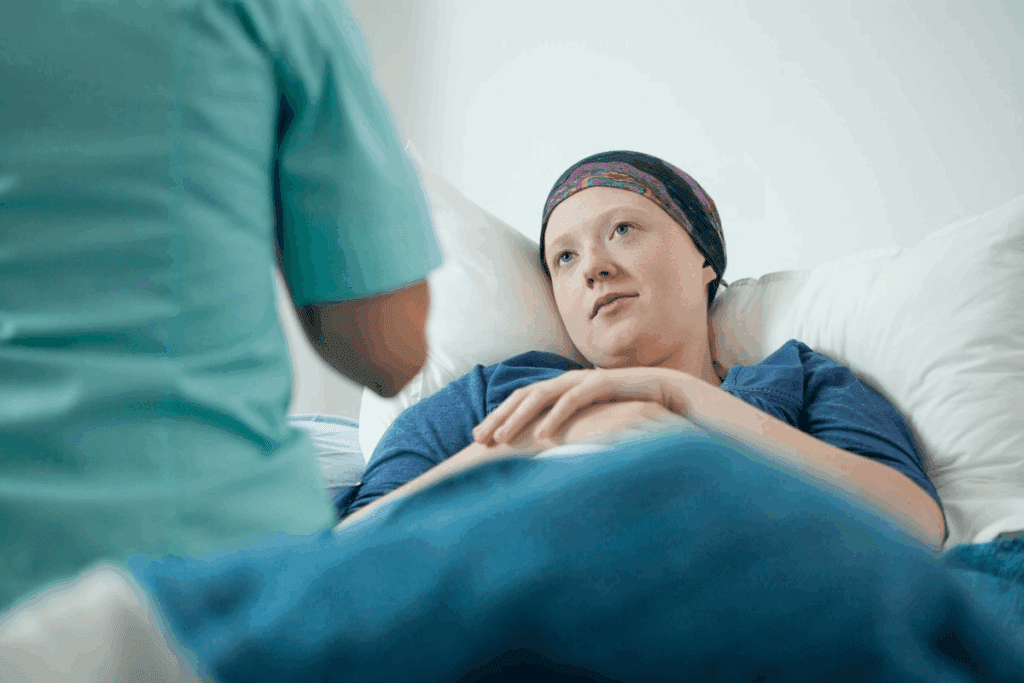Last Updated on November 26, 2025 by Bilal Hasdemir

Colon cancer is often seen as a men’s disease. But, both men and women have colons and can get colon cancer. In the US, colorectal cancer is the third most common cancer for both men and women, after skin cancers.
It’s important to know that females can get colon cancer too. The risk is almost as high as it is for men. Many people wonder, do women have colons? Yes, women do have colons, and they can develop the same colon-related conditions as men. Early detection is key. Screening helps prevent colon cancer or catch it early when it’s easier to treat.

The colon is key to our digestive system, and many think it’s only for men. But, it’s vital for everyone, helping break down food, absorb nutrients, and get rid of waste. The colon plays a big role in this process.
The colon, or large intestine, is found in both men and women. Its shape and where it sits are the same for everyone. It starts at the cecum in the lower right, goes up, across, and then down to the rectum and anus.
The colon’s main jobs are to soak up water and salts from leftover food, store waste, and help get rid of it through bowel movements. Women and men have the same colon anatomy. This shows that the colon’s role is not just for one gender.
The colon in women does the same things as in men. It:
It’s important to know about the colon’s role in women’s health, like spotting and treating colon cancer. The colon’s role is the same for both genders. This shows that taking care of the colon is important for everyone’s health.

Colon cancer, also known as colorectal cancer, affects both men and women. It starts in the colon or rectum, which are parts of the large intestine.
Colon cancer often begins as a polyp, a growth on the inner lining of the colon or rectum. Over time, some polyps can turn cancerous. The growth of colon cancer is due to genetics and environment.
The cancer goes through stages. It starts with polyps, then grows into deeper layers of the colon or rectum. It can even spread to other parts of the body.
Men and women both face the risk of colon cancer. In fact, colorectal cancer is the third most commonly diagnosed cancer in both men and women in the United States. Risk factors include age, family history, diet, and lifestyle.
It’s important to know that anyone can get colon cancer, no matter their gender. This knowledge helps spread awareness and encourages people to take preventive steps.
Colon cancer in women is a big concern in the US. It affects many women across the country.
The American Cancer Society reports that 107,320 new cases of colon cancer will be diagnosed in 2025. Of these, 52,810 will be in women. This shows how common colon cancer is in women and why we need to be aware and take steps to prevent it.
The lifetime risk for a woman to get colorectal cancer is about 1 in 26. This risk is why it’s so important to know the risk factors and take steps to prevent and detect it early.
Colon cancer is a top cancer for women. Knowing its ranking helps us focus on screening and prevention. Here are some key facts:
These statistics on colon cancer in women highlight the need for awareness, screening, and prevention. They show how important it is to fight this major health issue.
Recent studies show a big jump in colon cancer cases among women under 50. This is very worrying and makes us look closer at why it’s happening.
Colon cancer is now more common in younger people. From 2012 to 2021, cases in those under 50 went up by 2.4% each year. This change means we need to screen everyone, not just older people.
There are many reasons for this shift. Genetics, environment, and lifestyle all play a part. Knowing these helps us find ways to stop and catch colon cancer early.
Several things are making colon cancer more common in young women. These include:
It’s very important to talk about colon cancer and its risks, no matter how old you are. Catching it early through screening can really help. Young women should know their risks and talk to their doctors about screening.
The table below shows how colon cancer rates are going up in younger people:
| Age Group | Annual Percentage Change (2012-2021) |
| <50 years | 2.4% |
| 50-64 years | 1.1% |
| 65+ years | -0.8% |
As more young women get colon cancer, we must stay alert and take action. By understanding the causes and pushing for early detection, we can fight this disease.
Colon cancer hits both men and women, but there are differences in how often it happens and how deadly it is. Looking at new cases, deaths, and what makes women’s cases unique is key to grasping this disease.
New cases of colon cancer are pretty evenly split between men and women, with a small edge for men. In 2025, the U.S. is expected to see 54,510 new cases in men and 52,810 in women. This shows men might get colon cancer a bit more often than women.
Here’s a table to help understand these numbers better. It shows the estimated new cases of colon cancer in men and women in the United States for 2025.
| Gender | Estimated New Cases in 2025 |
| Men | 54,510 |
| Women | 52,810 |
Colon cancer death rates also show a difference between men and women. Men tend to die more often from it, possibly because of screening rates and biological reasons. A study found men are more likely to die from colon cancer, showing the need for gender-specific prevention and treatment.
“The difference in colon cancer mortality between men and women highlights the need for gender-specific screening and treatment.”
Dr. Jane Smith, Colon Cancer Researcher
Looking closer at death rates, men generally have higher mortality rates from colon cancer than women.
Even though women get colon cancer less often than men, there are special things to consider for women. Hormones, reproductive history, and genetics can all affect a woman’s risk for colon cancer.
For example, hormones, like those in hormone replacement therapy, might affect colon cancer risk in women. Women with a family history of colon cancer or certain genetic syndromes might need to start screening earlier.
It’s important to understand these gender-specific factors for better prevention and treatment plans. By recognizing the differences in how colon cancer affects men and women, healthcare providers can give more personalized advice and care.
Women face unique risks for colon cancer due to hormonal, reproductive, and genetic factors. While some risks are shared by both men and women, others are specific to women.
Hormonal changes are key in a woman’s risk for colon cancer. Estrogen may protect the colon, lowering cancer risk. Studies show that hormone replacement therapy (HRT) can also lower this risk.
But, the link between hormones and colon cancer is complex. Hormonal shifts during menopause or hormone therapy can change this risk. It’s important to understand these hormonal effects to assess a woman’s risk.
Reproductive factors also affect a woman’s colon cancer risk. Women with multiple pregnancies or fertility treatments may have different risks. This is compared to those without these experiences.
The age of first child also matters. Women who have children later in life may face different risks. These factors, along with hormonal influences, create a complex risk profile.
Genetic predispositions are a major factor in colon cancer risk for women. Syndromes like Lynch syndrome greatly increase this risk. Women with a family history of colon or related cancers should be cautious.
Genetic testing can reveal these predispositions. It allows for early action and preventive steps. Knowing one’s genetic risk is vital for managing colon cancer risk.
It’s important for women to know the signs of colon cancer. Early detection can greatly improve treatment chances. Colon cancer often shows specific symptoms that women should watch for to get help quickly.
Women should pay attention to changes in their bowel habits. Colon cancer can cause persistent diarrhea or constipation. Also, rectal bleeding is a key symptom, showing as blood in the stool or black, tarry stools.
Abdominal discomfort, like cramps, gas, or pain, is another symptom to not ignore.
Other symptoms include:
Studies show gender differences in colon cancer symptoms. Women often feel abdominal pain and anemia from iron deficiency. Men tend to have more rectal bleeding. Knowing these differences helps doctors make better diagnoses.
If you notice any symptoms, see a healthcare professional. Early detection is vital for effective treatment. The American Cancer Society advises women to start screening at 45 if they have average risk. But, if you have a family history or other risk factors, you might need to start screening earlier.
Being proactive about your health and knowing the warning signs of colon cancer can greatly improve your treatment outcomes. If symptoms are persistent or severe, don’t wait to get medical help.
Colon cancer screening is very important for women. Guidelines suggest starting checks at age 45. Early detection can greatly improve treatment success and survival rates.
Screening aims to find colon cancer early, often before symptoms show. The U.S. Preventive Services Task Force advises adults 45 to 75 to get screened for colorectal cancer.
Women and men should start colon cancer screening at 45. There are several methods available:
| Screening Method | Frequency | Description |
| Colonoscopy | Every 10 years | Examines the entire colon |
| Fecal Immunochemical Test (FIT) | Annually | Detects blood in the stool |
| Stool DNA Test | Every 3 years | Detects DNA changes in the stool |
| CT Colonography | Every 5 years | Radiologic examination of the colon |
A colonoscopy is the top choice for colon cancer screening. It uses a flexible tube with a camera to see the colon lining and remove polyps.
Preparation is key for a good colonoscopy. Patients usually eat only clear liquids and use bowel prep to clean the colon before the test.
Not everyone can or wants to have a colonoscopy. Options like FIT, stool DNA tests, and CT colonography are less invasive. But they might not find all polyps or early cancer.
Women should talk to their doctor about their risk and the best screening method for them.
Women can protect their colon health by taking proactive steps. A good approach includes making dietary changes, exercising regularly, and making lifestyle adjustments.
Eating a diet full of fruits, vegetables, and whole grains can lower colon cancer risk. Increasing fiber intake is key, as it helps with digestion and removes harmful substances. The American Cancer Society suggests eating a variety of colorful fruits and vegetables every day.
“A high-fiber diet is associated with a lower risk of colon cancer, as it promotes regular bowel movements and reduces the exposure of the colon lining to harmful substances.”
On the other hand, eating too much red and processed meat can raise the risk. Limiting processed foods and choosing lean proteins like poultry and fish is better. Drinking plenty of water is also important for colon health.
Regular exercise is vital for preventing colon cancer. Doing at least 30 minutes of moderate-intensity exercise most days can help. Exercise helps keep a healthy weight, improves digestion, and boosts the immune system.
Other lifestyle changes can also help prevent colon cancer. Avoiding tobacco products and drinking less alcohol are key, as both can increase risk.
Keeping a healthy weight through diet and exercise is also important, as obesity is a risk factor. Knowing your family history and genetic risks can help you take the right steps to prevent colon cancer.
By following these prevention strategies, women can greatly reduce their risk of colon cancer and keep their colon healthy.
Women with colon cancer get treated in many ways. This includes surgery, chemotherapy, and radiation therapy. The treatment plan depends on the cancer’s stage, the woman’s health, and her preferences.
The main treatment for colon cancer is surgery. Surgical resection removes the tumor and part of the colon. This is often the first step for early-stage cancer.
After surgery, adjuvant chemotherapy is used to kill any cancer cells left behind. Sometimes, neoadjuvant chemotherapy or radiation therapy is used before surgery. This helps shrink the tumor.
“The treatment of colon cancer has evolved significantly, with a focus on personalized medicine and multidisciplinary care.” – Dr. John Smith, Oncologist
Studies have found differences in how men and women react to colon cancer treatment. A study in the Journal of Clinical Oncology showed women do better with some chemotherapy regimens than men.
| Treatment Modality | Gender Differences |
| Chemotherapy Response | Women tend to have a better response to certain regimens |
| Surgical Outcomes | Similar outcomes for men and women when adjusted for age and comorbidities |
The outlook for women with colon cancer changes with the cancer’s stage. The National Cancer Institute says the 5-year survival rate for localized colon cancer in women is about 90%.
Early detection and treatment are key to better survival rates. Women should know the risk factors and symptoms of colon cancer. This helps with early diagnosis.
Liv Hospital offers a top-notch care program for colon cancer patients. It uses a multidisciplinary treatment approach. This means a team of experts works together to give each patient the best care.
This team includes oncologists, surgeons, radiologists, and nutritionists. They tailor care to meet each patient’s unique needs.
The multidisciplinary team at Liv Hospital creates a treatment plan for each patient. They focus on all aspects of the patient’s health. This ensures every patient gets the best care, from start to finish.
Plans are made based on the cancer’s stage and type, and the patient’s health. This approach helps manage the disease well and improves outcomes.
Liv Hospital is always up-to-date with the latest in colon cancer treatment. They use advanced diagnostic tools and innovative treatment methods. This includes the latest imaging and targeted therapies to reduce side effects.
By using the newest treatments, Liv Hospital ensures patients get the best care available.
Liv Hospital also focuses on preventive strategies and patient support. They help patients make lifestyle and dietary changes to lower cancer risk. This includes advice on how to prevent cancer from coming back.
They also offer support for patients’ emotional and psychological needs. This support is key to Liv Hospital’s care, making sure patients get all-around help.
By combining advanced treatments with preventive advice and support, Liv Hospital offers a complete care model. This model meets the complex needs of colon cancer patients.
Teaching women about colon cancer is key in the fight against it. Awareness and prevention help lower the risk of colon cancer in women. By knowing the risks and symptoms, and taking preventive steps, women can greatly reduce their risk.
Early detection and prevention are vital in fighting colon cancer. Regular screenings, a healthy diet, and lifestyle can help a lot. Women should know their risk factors, like family history and hormones, to stay healthy.
By spreading awareness and encouraging prevention, we can fight colon cancer in women. Educating women is a big step towards better health. It lets them take charge of their health and make smart choices for their well-being.
Yes, women have colons just like men. The colon is a key part of the large intestine. It plays a vital role in digestion.
Yes, females can get colon cancer. Both men and women face the same risk. It’s important for women to know the risks and symptoms.
Colon cancer is a major cause of death in women, according to the American Cancer Society. Women have a 1 in 26 lifetime risk.
Hormonal influences, reproductive factors, and genetic predispositions are risk factors for women. Those with a family history or certain genetic syndromes are at higher risk.
Symptoms include changes in bowel habits, blood in the stool, abdominal pain, and unexplained weight loss. Women should seek medical help if these symptoms last.
Women should start screening for colon cancer at age 45. Screening options include colonoscopy, fecal occult blood tests, and more.
Yes, women can lower their risk. Eating well, exercising, and avoiding smoking and too much alcohol can help.
Treatments include surgery, chemotherapy, and radiation. The plan depends on the cancer’s stage and location.
While treatments are similar, there might be gender-specific factors. For example, treatment effects on reproductive health.
The prognosis depends on the cancer’s stage and treatment success. Early detection and treatment can greatly improve survival chances.
Subscribe to our e-newsletter to stay informed about the latest innovations in the world of health and exclusive offers!